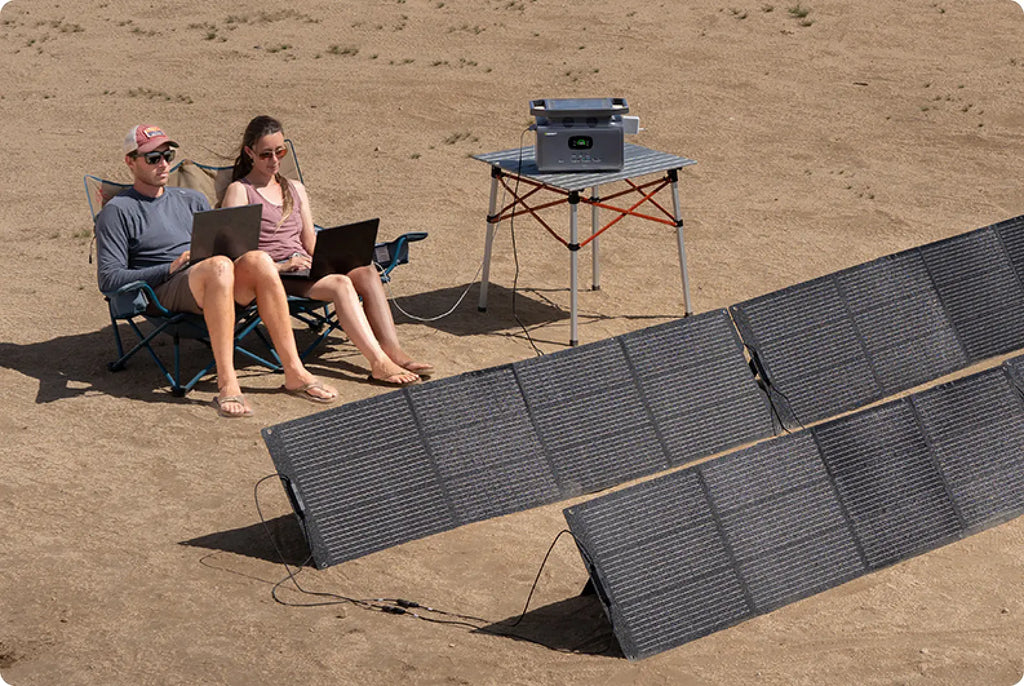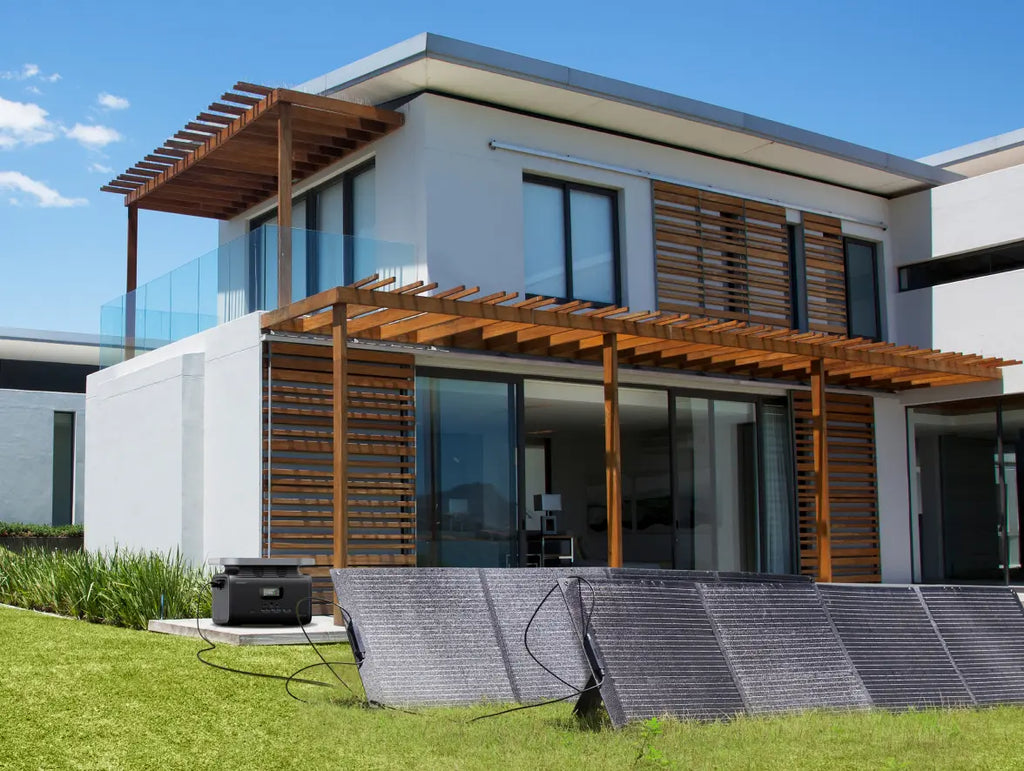As concerns about the environment rise, a lot of people are becoming more familiar with renewable energy sources. The solar power system is currently the most widely used renewable source of energy in the US. Last year, nationwide solar production capacity exceeded 135,700 MW, which means around 24 million homes have turned to solar power.
But, despite the rising use and popularity of solar energy, many people are still on the fence about using it. One of the reasons is that they are still not sure about using an off-grid solar system, an on-grid solar system, or a hybrid of the two. So, if you are one of these people, read on to learn more about this interesting topic!

What Is an Off-Grid System?
An off-grid solar system, as the name implies, is completely independent from the grid. It is a self-reliant arrangement, which means you as a homeowner will rely 100% on the solar energy they capture and the electricity they create. Because the sun only shines during the day, a homeowner will need a storage device to maintain the electricity supply once the sun sets.
Advantages of Off-Grid Systems
By far, there are already 490 million people who have adopted the off-grid system. Here are some of the reasons for the system’s popularity.
Independence From the Grid
The grid is often unreliable, especially in remote areas. Also, many grid operators still use electricity from dirty energy sources. There are some of the things that make people want to go off-grid. In addition, you can also stop worrying about not having an electricity supply during a power outage situation.
Energy Self-Sufficiency
When you make your own electricity, you don’t have to think about the fluctuating energy prices. Energy prices have soared over the past few years. A report from EIA says that there has been a 197% increase from 2020 to 2022. Because you are not connected to the grid, this rising price will not affect you at all.
Remote Location Suitability
If you live in a remote location (or want to move to one) having an off-grid system is a must. It makes things much simpler than going any other way. You can just build your home, set up your solar power system, and enjoy the electricity you make. There is no need to bother yourself with a complicated procedure to have your home connected to the grid.
Disadvantages of Off-Grid Systems
Of course, an off-grid system is not without flaws. Just like any other electricity system on the planet, it has certain drawbacks, and below are some of them.
Higher Upfront Costs
There are several components you need to have a working off-grid system. These include solar panels, an inverter, a battery pack, and an output regulator. There is certainly a price you have to pay to buy and install each of these components. While there are affordable alternatives, quality components can cost you quite a fortune.
Limited Power Capacity
The amount of electricity you can store and use will be limited by your battery pack capacity. Battery pack prices are not cheap at all, especially if you want ones with higher quality. Therefore, to optimize your electricity use and make sure you have enough energy to fulfill your needs, you will also need to buy energy-efficient appliances.
Maintenance Challenges
Thanks to today’s advancement in the industry, solar panels can easily last more than two decades. However, your battery pack does not last that long. Thus, you will come to a point where you need to replace it with a new one. Also, you have to ensure that your battery packs are equally charged if you have more than one.

What Is an On-Grid Solar System?
An on-grid solar system, on the other hand, is an arrangement in which a home uses electricity supply from both solar panels and the grid. The thing with the on-grid system is that it does not need a battery pack to run. We can always use electricity from the grid in case our solar power system does not produce enough power.
Advantages of On-Grid Solar Systems
The on-grid system is by far the most widely used solar energy arrangement in the world. Obviously, there are reasons for why so many people choose this system.
Grid Reliability
The solar panels available today are great. They have become more efficient and economical over time. Unfortunately, when it comes to reliability, it still falls short. The electricity from the grid is stable most of the time. The maintenance of an on-grid system is also very simple since there is rarely a need for component replacement.
Net Metering Benefits
An on-grid system includes a metering device that monitors and records how much electricity we use and how much of it gets sent to the grid. This means you don’t just save money on electricity bills but may also have a profit from the electricity you send to the grid. This means none of the electricity you make goes unused.
Lower Initial Investment
With an on-grid system, there is no need to buy a battery pack, and this can greatly reduce your upfront costs. Unless you have enough money to buy the components and want to be fully committed to solar energy, then an on-grid system is still the best option here. Also, there is no need to change your appliances with energy-efficient models.
Disadvantages of On-Grid Solar Systems
What about the drawbacks of an on-grid system? Well, there are actually quite a few, and here are some of them.
Grid Dependency
Because of the absence of a battery pack, it means the grid is your only safety net when your solar panels stop producing electricity. In other words, when there is an outage on the grid system, all you can do is cross your fingers and hope that your solar panels can make enough power until grid electricity is available again.
Lack of Energy Storage
Yes, the lack of an energy storage system is actually a big issue in an on-grid system. If you have an outage during the night, your home will completely blackout, just like the rest of the neighborhood. A home with an off-grid system, on the other hand, will never experience this issue since they have a backup power source.
Grid Outage Issues
Because it is still tied to the grid, an on-grid system will still be subject to several regulations. For example, whenever there is an outage in the grid system, an on-grid system will be forced to shut down as well. The reason for this is to protect utility workers repairing the issue from getting shocked by electricity from your solar panel.
What Are the Differences Between On-Grid and Off-Grid Solar Systems?
Now that you have learned about the pluses and minuses of each solar power system, we will talk in greater detail about both of them.
Access to Electricity
The easiest way to understand how each system gets electricity access is by referring to its name. Off means the system is disconnected from the grid, meanwhile on means the system is connected to the grid. When solar power production is too low, an off-grid system will draw in electricity from a battery pack and an on-grid system will draw in electricity from the grid.
Excess Production
There will be times when there is too much solar panel power production, and both off-grid and on-grid systems will handle the situations differently. The first one will send the electricity surplus to the battery pack. The latter one, on the other hand, will send the surplus electricity to the grid, which can later be converted to credits.
Power Outages
Because one is connected to the grid and the other is not, on-grid and off-grid systems also work differently during power outage situations. An off-grid system will not be affected at all by an outage, whereas an on-grid system will be forced to stop its electricity production process. This is mandated by the regulations.
Electric Bills
The difference between off-grid and on-grid systems is also very clear when it comes to electric bills. Because it does not use any electricity from the grid, the electricity bill for an off-grid system is ZERO. Meanwhile, there are still electricity costs related to an on-grid system. However, these costs may be compensated with the credits.
Using a Hybrid Solar System
If you want to get the best out of both worlds, then you can get yourself a hybrid solar power system. With this system, you can make use of the grid’s stability and the battery pack’s reliability. Thus, when there is an outage, you can simply disconnect your home from the grid and draw electricity from the battery pack.
Final Thoughts
Now, which solar power system do you think suits your needs best? It is, obviously, hard to say which system is better since every homeowner will have a different lifestyle to sustain and priorities to meet. Whichever system you choose, it is best if you contact a renewable energy expert first and discuss your situation and goals with them.






